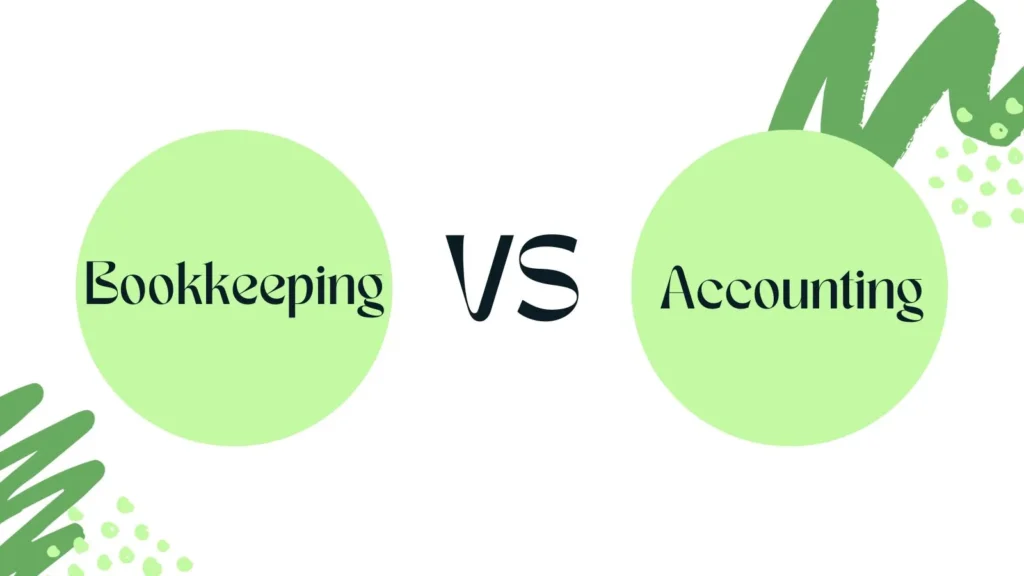Updated on October 5, 2024
In the world of finance and business management, the terms bookkeeping and accounting are often used interchangeably. However, they represent different aspects of financial management and cover different sets of responsibilities, skills, and objectives. Understanding the difference between bookkeeping and accounting is crucial for businesses to ensure effective financial management.
Key Takeaways
- Bookkeeping focuses on the daily recording and organization of financial transactions, laying the foundation for more detailed financial analysis.
- Accounting focuses on analyzing, interpreting, and presenting financial data to provide a comprehensive view of a business’s financial health.
- While it’s possible for one person to handle both roles, it’s essential that they possess the necessary qualifications to ensure accuracy and efficiency in both fields.
What is Bookkeeping?
Bookkeeping is the process of recording and organizing a business’s financial transactions. It involves the systematic documentation of every financial detail, ensuring that every purchase, receipt, sale, and payment is accurately captured. Bookkeeping is the foundational step in the accounting process, setting the stage for more intricate financial tasks and analyses.

What are The Functions of Bookkeeping?
- Recording Transactions: Bookkeeping ensures that every financial activity, from sales to expenses, is documented daily.
- Organizing Financial Data: Transactions are categorized in order, making it easier for accountants to retrieve and analyze the data when needed.
- Reviewing Bank Statements: Bookkeepers ensure that the business’s records align with bank statements, identifying and addressing any discrepancies.
- Managing Accounts: This includes overseeing the company’s assets, liabilities, and equities.
- Preparing Financial Statements: Preliminary financial statements, such as income statements and balance sheets, are prepared based on the recorded data.
What Does a Bookkeeper Do?
A bookkeeper’s primary role is to ensure accuracy in the financial records of a business. They are responsible for the day-to-day financial activities, making sure that every financial transaction aligns with the bank statements, and preparing business accounts for more complex accounting tasks. They ensure that if invoices aren’t paid correctly, if payroll isn’t handled accurately, or if expenses aren’t verified, then the transactions will be properly recorded or classified. Their meticulous attention to detail sets the stage for accountants to perform deeper financial analyses and interpretations.
What Credentials Do Bookkeepers Need?
While bookkeepers aren’t necessarily required to have a bachelor’s degree, some might take finance-related college courses to enhance their skills. Certifications, such as the one from the American Institute of Professional Bookkeepers, can further bolster their professional standing and credibility in the field.

How Much Does a Bookkeeper Charge?
The average hourly rate for a bookkeeper is around $37. However, this rate can vary based on factors such as the bookkeeper’s location, experience, and the complexity of the tasks they’re handling. With the rise of virtual services, virtual bookkeepers can also be a cost-effective alternative, potentially offering different pricing packages tailored to your unique needs.
What is Accounting?
Accounting is not just about the systematic recording of financial data, but it also encompasses the analysis, interpretation, and presentation of this data. The difference between bookkeeping and accounting is that while bookkeeping focuses on the basic details of your financial data, accounting looks at the bigger picture, drawing conclusions about a business’s financial health. Accounting requires more logic and problem-solving skills than bookkeeping and relies on the foundational data provided by bookkeeping.

What are the Functions of Accounting?
- Optimizing Business Tax Returns: Accountants ensure that businesses achieve the best possible tax outcomes.
- Finding New Tax Deductions: They identify potential tax-saving opportunities.
- Preparing and Filing Taxes: Accountants ensure that tax returns are prepared accurately and filed on time.
- Recognizing Problems: They are in charge of spotting financial discrepancies or issues that might affect the business.
- Maintaining Cash Flow: Accountants help in managing and forecasting cash flow to ensure business liquidity.
- Identifying Areas of Growth: They analyze financial records to find out potential areas for business improvement.
What Does an Accountant Do?
Accountants possess specialized knowledge that allows them to view the broader financial picture of a business. They are qualified to create financial statements for both employers and investors. Additionally, they can create budgets, help small business owners plan for the future, and provide specific tax advice. One of the key strengths that make an accountant outstanding is their ability to recognize potential risks before they significantly impact the business, such as disappearing inventory or consistently late customer payments.
What Credentials Do Accountants Need?
Accountants typically have a bachelor’s degree, and many also pursue a master’s degree in accounting or a related field. Many tax accountants hold a Certified Public Accountant (CPA) license. Additionally, an Enrolled Agent (EA) is a specialized type of accountant who can advocate on behalf of a business when dealing with the IRS.

How Much Does an Accountant Charge?
The typical hourly rate for an accountant ranges between $150 and $400. For small businesses, it might be more cost-effective to retain an accountant on a retainer basis or engage them strategically throughout the year. For instance, some business owners might only hire accountants for tax filing purposes, which can cost between $300 and $1,500, depending on the business’s structure and the complexity of the business’s financial situation.
The Key Differences Between Bookkeeping and Accounting
Scope of Work
Bookkeepers are primarily responsible for maintaining a detailed and accurate record of every financial transaction, including sales, purchases, and payments.
Accountants, on a broader scale, analyze the business’s financial records, identify issues, and suggest opportunities for improvement. They delve deeper into every number, interpreting and explaining them to gain insights into the business’s financial health.
Skill Level
Bookkeepers are not necessarily required to have a bachelor’s degree. Their main skills lie in being detail-oriented, organized, and meticulous.
Accountants typically have a bachelor’s degree and often a master’s degree in accounting or a related field. They need to possess strong logic, problem-solving skills, and a deep understanding of tax laws and financial principles.
Ultimate Goals
The ultimate goal of bookkeeping is to ensure that every financial transaction is recorded accurately, providing a clear and organized view of the business’s financial activities.
The ultimate goal of accounting is to create comprehensive financial reports that support important business decisions and strategies.

Task Frequency
Bookkeeping is a day-to-day administrative role, focusing on immediate financial transactions.
The analysis part of accounting can be a periodic task (weekly, monthly, or quarterly) that offers a systematic and analytical look at the business’s financial data.
Which Service Do You Need?
The service you need depends on the size, growth stage, and complexity of your business. If you’re a small business owner handling straightforward transactions, bookkeeping might suffice. However, as your business grows and financial matters become more complex, you’ll benefit from the analytical and strategic insights provided by an accountant.
Can One Person Handle Both Bookkeeping and Accounting?
Yes, one person can handle both bookkeeping and accounting, especially if they have the necessary qualifications and experience. An accountant, with the right certifications, can effectively manage both accounting and bookkeeping tasks. However, a bookkeeper without proper accounting certifications might not be equipped to handle complex accounting tasks. It’s essential to ensure that the individual has the skills and knowledge required for both roles if they are to manage both effectively.
>> You may find interesting:
The Bottom Line
The difference between bookkeeping and accounting is clear, as they serve different roles in the financial landscape of a business. While bookkeeping lays the groundwork by meticulously recording and organizing every financial transaction, accounting relies on this foundation to offer deeper analytics, insights, and strategic recommendations. Both roles are vital; therefore, understanding the difference between bookkeeping and accounting can help businesses optimize their financial operations for maximum efficiency. At XOA TAX, we offer comprehensive tax and accounting services tailored to meet the unique needs of every business, ensuring that both your bookkeeping and accounting needs are expertly addressed.
Frequently Asked Questions
1. What are the benefits of hiring a professional for bookkeeping and accounting tasks compared to managing finances independently?
Unlocking the Benefits of Professional Bookkeeping and Accounting
Navigating the financial landscape of your business can be challenging, but hiring professionals for bookkeeping and accounting can offer substantial advantages over managing finances on your own. Let’s dive into some key benefits:
- Expert Accuracy and Efficiency
- Precision in Financial Records: Professionals ensure that your financial records are accurate and organized, reducing the risk of costly errors. They handle complex tasks with ease, providing peace of mind.
- Time-Saving: By outsourcing these tasks, you free up your time to focus on core business activities. Remember, every minute not spent on bookkeeping is a minute you can invest in growing your business.
- Tailored Financial Strategy
- Strategic Insights: Accountants offer strategic advice that aligns with your business goals. Their expertise can guide you in making informed financial decisions that drive long-term growth.
- Tax Optimization: Professionals ensure that your tax filings are accurate and timely, helping you avoid penalties while maximizing deductions and credits.
- Reduced Stress and Improved Confidence
- Reduced Financial Stress: Knowing that skilled professionals are managing your finances can significantly lower stress levels, letting you concentrate on what you do best.
- Increased Confidence: With accurate financial insights and reports, you gain better control and understanding of your business’s financial health, empowering you to make more confident decisions.
- Scalable Solutions
- Adaptability to Growth: As your business grows, financial needs become more complex. Professionals can adapt their services to match your evolving requirements, ensuring scalability.
In essence, hiring professional bookkeepers and accountants allows you to leverage their expertise for detailed and strategic financial management that fuels your business’s success. Investing in their services will provide you with the tools and insights needed to accelerate growth and drive your business forward.
2. How can organized financial records and strategic financial planning contribute to business success?
How Do Organized Financial Records and Strategic Financial Planning Drive Business Success?
Organized financial records are the backbone of any thriving business. By keeping meticulous records, you can gain clarity on your company’s financial health and make informed decisions. This transparency allows you to identify potential areas for cost reduction, optimize cash flow, and forecast future financial needs.
Strategic financial planning is equally vital. By aligning financial goals with overall business objectives, you can construct a roadmap for growth. This approach involves budgeting, setting financial targets, and assessing investment opportunities, which all contribute to sustaining and scaling your business.
Benefits of Organized Records and Strategic Planning:
- Improved Cash Flow Management: Accurate records show where money is coming from and going to, allowing better cash flow predictions and preparations.
- Efficient Tax Filing: Proper documentation simplifies tax processes, ensuring compliance and maximizing deductions.
- Enhanced Decision-Making: With clear insights into financial standing, businesses can make strategic choices that align with long-term goals.
- Investor Confidence: Well-maintained records and a solid financial plan increase credibility with investors and stakeholders.
Ultimately, it’s the integration of organized records with strategic planning that lays the foundation for lasting business success.
3. How do bookkeeping and accounting software differ in their functions?
How Do Bookkeeping and Accounting Software Differ in Their Functions?
In today’s digital landscape, many accounting software programs efficiently handle both bookkeeping and accounting tasks. However, understanding the distinct functions each serves can help businesses choose the right tools to meet their needs.
Bookkeeping Functions
Bookkeeping software primarily focuses on organizing and recording financial transactions. It serves as the backbone of financial data management, ensuring that every sale, purchase, and expense is tracked accurately. Essential features often include:
- Transaction Recording: Captures financial data and categorizes expenses and revenues.
- Bank Reconciliation: Matches transactions with bank statements to ensure accuracy.
- Expense Tracking: Monitors operational costs in real time.
- Invoicing: Generates and manages customer invoices.
Accounting Functions
On the other hand, accounting software builds upon the data curated by bookkeeping tools. Its primary role is to interpret, categorize, and analyze financial data to support strategic decision-making. Key functions typically include:
- Financial Reporting: Produces comprehensive reports like profit and loss statements, balance sheets, and cash flow statements.
- Trend Analysis: Analyzes past financial performance to identify trends and patterns.
- Budgeting: Assists in planning and controlling future financial performance.
- Tax Preparation: Prepares necessary documentation for tax filing.
Integrated Solutions
Many modern platforms offer integrated solutions that consolidate both bookkeeping and accounting functionalities, streamlining financial management processes. A popular example is QuickBooks, which offers tools for accurate data logging and powerful features for financial analysis and report generation. Its flexibility suits businesses that require both comprehensive bookkeeping services and in-depth accounting analysis.
By distinguishing between bookkeeping and accounting functionalities, businesses can better identify software solutions that offer the precise tools they need to manage and grow their financial health effectively.
4. How does the complexity of a bookkeeping system vary based on business size and transaction volume?
How Does the Complexity of a Bookkeeping System Vary Based on Business Size and Transaction Volume?
The intricacy of a bookkeeping system is significantly influenced by both the scale of the business and the frequency or volume of transactions it handles.
Business Size and Bookkeeping Complexity
- Small Businesses: For smaller businesses with fewer transactions, a simple, straightforward system is usually sufficient. These systems often rely on basic accounting software or even manual spreadsheets. The focus is primarily on recording sales and expenses to maintain accurate financial records.
- Mid-Sized Businesses: As businesses grow in size, the bookkeeping system needs to expand accordingly. This might include the integration of more sophisticated accounting tools like QuickBooks or Xero to efficiently manage an increased volume of transactions. Additional layers, such as budgeting and forecasting, could become necessary to support business growth.
- Large Enterprises: In contrast, large corporations typically require comprehensive accounting systems. These systems are designed to accommodate high transaction volumes and complex financial reporting requirements. They often incorporate enterprise resource planning (ERP) tools like SAP or Oracle to streamline processes across various departments.
Impact of Transaction Volume
- Low Transaction Volume: Businesses with a lower number of daily or weekly transactions can afford a less complex system. The focus is on simplicity and efficiency in maintaining accurate records without overwhelming the process.
- High Transaction Volume: For companies with high transaction volumes, a more robust system is essential. These systems need to handle and accurately record frequent transactions while ensuring compliance and generating detailed reports. Supporting documents become crucial, facilitating transparency and accuracy in financial records.
In essence, both the size of the business and the transaction volume dictate how simple or sophisticated a bookkeeping system needs to be. As either increases, so too does the necessity for a more complex system to ensure thorough financial management.
5. What is the role of a general ledger in bookkeeping?
Understanding the Role of a General Ledger in Bookkeeping
A general ledger is fundamental to bookkeeping; it acts as the backbone of your record-keeping system. At its core, the general ledger is where all financial transactions—including sales and expenses—are documented. This process, known as “posting,” is essential for keeping your financial information organized.
Key Functions of a General Ledger
- Central Repository of Transactions:
- All sales and purchases your business undertakes are meticulously recorded here.
- Whether using specialized software, a spreadsheet program, or, less commonly, a manual method, the accuracy of this recording is vital.
- Supports Complex Bookkeeping Systems:
- The complexity of a bookkeeping system often reflects the business size and transaction volume.
- As your business grows, so does the need for a robust system to handle the increased transactions.
- Foundation for Accounting:
- The ledger is not just about tracking transactions—it lays the groundwork for the accounting process.
- It enables the pulling and analysis of financial data, crucial for creating accurate financial reports and statements.
- Compliance and Documentation:
- Government bodies like the IRS have specific requirements for documenting certain transactions.
- Your ledger, coupled with the necessary supporting documents, ensures compliance with these regulations.
In summary, the general ledger is more than just a record; it’s the epicenter of your bookkeeping activities. By thoroughly documenting every financial transaction, it ensures that your business’s financial health is transparent and manageable, setting a firm foundation for future accounting processes.
6. What are some examples of popular accounting software that offer both bookkeeping and accounting services?
When Exploring Popular Accounting Software Offering Both Bookkeeping and Accounting Services
Two standout options are QuickBooks and Xero.
QuickBooks
- Bookkeeping Assistance: Users can choose between a live-assisted setup, which includes guidance from a professional, or full-service bookkeeping where tasks are handled for you.
- Comprehensive Accounting Tools: The software enables detailed reporting and data analysis. For businesses seeking advanced capabilities, QuickBooks Online Advanced provides enhanced tracking and reporting tools.
Xero
- Complete Bookkeeping Services: It integrates seamlessly with various accounts, simplifying transaction tracking and financial oversight.
- Robust Accounting Solutions: Xero provides extensive reporting options, ensuring businesses can keep a keen eye on their financial health. Additionally, its collaborative tools allow you to work closely with your accountant and enjoy real-time visibility.
Both platforms are designed not just to manage financial records but to streamline and enhance the financial health of your business. Whether you’re a small startup or an established company, these tools provide essential services that scale with your business’s growth.
Additional Resources
- Our Expertly Crafted E-Book on Bookkeeping
- Single Entry Bookkeeping: An Essential Guide For Beginners
- Double Entry Bookkeeping: A Method to Keep Your Books Balanced and Perfect
- The Federal Insurance Contributions Act (FICA)
- What Is a Bank Reconciliation Statement, and How Is It Done?
- Dive into our expertly crafted e-book on bookkeeping and discover the golden keys to financial mastery.








 anywhere
anywhere  anytime
anytime